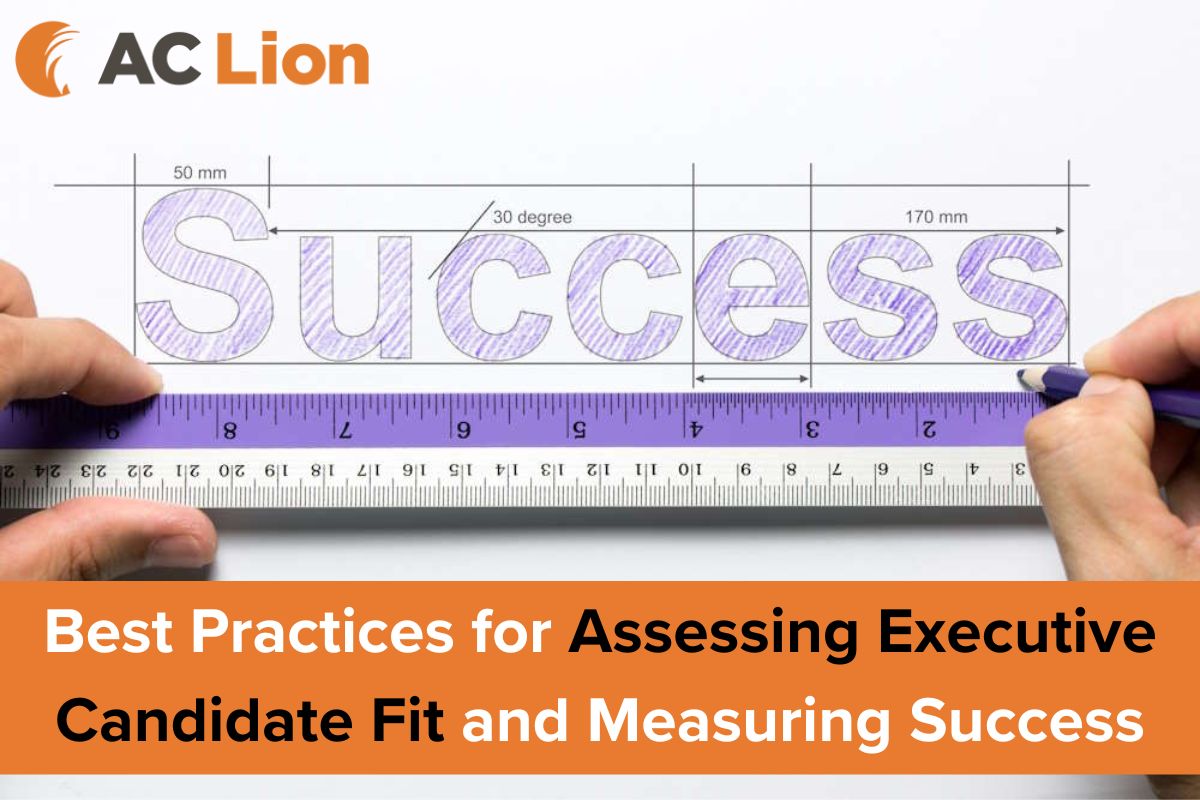Best Practices for Assessing Executive Candidate Fit and Measuring Success


Executive recruitment identifies, attracts, and results in hiring top-level management candidates with exemplary skills, experience, and leadership acumen to shape a company’s future and drive its overall success.
However, with a limited, highly sought-after talent pool raising the stakes and the need for discretion, organizations must adopt best practices for assessing executive fit.
The following sections will provide practical insights, best practices, and actionable executive recruitment strategies for successful leadership hiring.
Identifying the Ideal Executive Candidate
Organizations should consider the following essential qualities when searching for the best-suited executive candidate.
- A strategic thinker with a long-term vision and the foresight to anticipate future challenges
- The adaptability to evolve, pivot when necessary, and lead through uncertainty
- Industry-specific experience and understanding of nuances, trends, and challenges
- A track record of success and delivering results in similar roles
- A leadership style that aligns with the company’s values and culture
- The ability to inspire and motivate teams through effective communication and a positive, inclusive work environment.
Strategies for Executive Talent Sourcing
Organizations can source executive talent through a few tried and tested methods separately or in combination to ensure the best fit and increase the likelihood of long-term success.
Traditional Executive Search Firms
For highly specialized roles or industries with limited talent pools, executive search firms like ACLion have long been the go-to and remain the preferred choice. Their extensive networks and expertise enable them to identify candidates with the required skills and industry-specific knowledge.
Modern Networking Platforms
However, modern networking platforms like LinkedIn, with over 930 million users worldwide, have revolutionized how professionals and recruiters connect and network. These platforms can be particularly effective when seeking executives for broader or niche roles, searching for candidates based on specific criteria, and gaining insights into a candidate’s reputation and professional network.
The Value of Internal Promotion
Rather than looking outward, organizations can leverage the expertise and potential of existing employees who have already demonstrated their dedication and understanding of the organization’s values. Since internal candidates possess familiarity with the company’s operations, this approach reduces onboarding time and costs.
Assessing Executive Fit Through Leadership Assessment Techniques and Tools
The following techniques and tools can help organizations evaluate candidates thoroughly to select executives with the necessary qualifications, skills, traits, and potential to excel in their roles.
Structured Interviews
Twice as effective as traditional interviewing for avoiding a bad hire, structured interviews can better evaluate leadership potential, decision-making skills, and problem-solving abilities. Companies can gain invaluable insights through the score derived from presenting the same ordered set of targeted questions to each candidate.
Psychometric Testing
To gain a deeper understanding of a candidate’s personality traits and cognitive abilities, this scientifically validated assessment provides objective insights into an individual’s behavioral tendencies, emotional intelligence, and critical-thinking capabilities, ensuring that the candidate’s personality aligns with the company culture, values, and goals.
Organizations can employ several different types of psychological assessment tools. The most common assessments include the following.
- Personality questionnaires probe into a candidate’s traits, values, and motivations.
- Cognitive ability tests assess a candidate’s critical thinking skills, problem-solving abilities, and intellectual aptitude for complex decision-making, strategic planning, and managing ambiguity.
Case Studies or Situational Analysis
These practical exercises that present complex problems or real-world dilemmas enable organizations to observe the candidate’s analytical thinking, strategic decision-making, and problem-solving abilities, providing a glimpse into how a candidate may handle pressure, adapt to change, and collaborate with others.
The Role of Executive Recruitment Technology
Companies increasingly have turned to technological advancements to assist in finding the perfect executive fit.
- AI algorithms can sift through mountains of data, analyzing factors such as education, job experience, performance metrics, and social media presence to identify candidates with the necessary skills and qualifications quickly. And it can predict the success of these candidates based on historical data and patterns, providing organizations with valuable insights.
- Data analytics can identify patterns in successful hires, helping recruiters focus their efforts on candidates likely to thrive in the organization. Also, it can identify areas for improvement in the recruitment process, enabling organizations to refine their approach continuously.
These cutting-edge technologies allow organizations to personalize recruitment by creating a more targeted and tailored candidate experience. Also, they have the potential to address the issue of biases in the recruitment process by objectively evaluating candidates based on their qualifications and performance without being influenced by factors such as gender, race, or personal connections.
However, while AI algorithms and data analytics can provide valuable insights, they should not replace human judgment and intuition. Assessing the cultural fit and potential leadership abilities of executive candidates cannot be fully captured by technology alone.
Measuring Success with Executive Recruitment KPIs
Organizations can establish effective methods for measuring recruitment success by defining the following Key Performance Indicators (KPIs).
- Setting time-to-hire timelines helps organizations assess their efficiency in identifying and onboarding suitable executive candidates.
- Measuring retention rates allows a comprehensive understanding of whether selected candidates successfully integrate into the organization.
- Evaluating post-hire performance metrics reveals whether candidates have contributed to the company’s growth and success.
Organizations should consider long-term indicators that assess an executive’s success in achieving company goals, driving revenue growth, and their impact on company growth and team morale in shaping the organization’s strategic direction and influence in the market.
Continuous evaluation of the recruitment process and feedback mechanisms that welcome input from recently hired executives can provide valuable insights and perspectives on the clarity of job descriptions, interview processes, and overall candidate experience. This information can help organizations refine their recruitment strategies.
Overcoming Executive Recruitment Challenges
Organizations can overcome executive recruitment challenges by adopting these strategic and proactive approaches.
Ensuring Diversity in Leadership Roles
Companies must break free from traditional hiring practices and incorporate strategies focusing on diversity and inclusion to attract and retain top executive talent from various backgrounds.
Promoting Inclusive Recruitment
Organizations can provide diverse interviewers to encourage different perspectives during the assessment process. Additionally, blind screening techniques can help remove unconscious biases influencing decision-making.
Compensation Negotiation
To balance the candidate’s salary expectations with market standards, conduct thorough research on the prevailing compensation trends in the industry. Open and transparent communication throughout the negotiation process can further ensure satisfaction between both parties with the final agreement.
Attracting Top Executive Talent
Organizations can focus on employer branding by showcasing their values, culture, and opportunities for growth to stand out and differentiate themselves from their competitors. Also, companies can gain an edge by communicating their unique value proposition to potential candidates, such as flexible work arrangements, professional development opportunities, or an inclusive work environment.
Ensuring Confidentiality and Discretion in Executive Recruitment
To safeguard the company’s interests and ensure potential candidates’ privacy and reputation, use secure communication methods, implement data privacy protocols, and provide non-disclosure agreements (NDAs) explicitly outlining the confidential nature of the recruitment process.
Future Executive Recruitment Trends
As the business landscape continues evolving and adapting to new realities, executive recruitment must keep pace with these changes. These emerging trends will shape the assessment and measurement of executive candidate fit.
- With the rise of remote work, the executive recruitment processes must adapt to evaluate self-motivation, communication skills, and the ability to collaborate effectively across different time zones and cultures.
- Soft skills, such as emotional intelligence, adaptability, and the ability to navigate complex and uncertain situations, will be highly sought after and in high demand.
Companies should consider adapting their assessment tools and techniques to reflect these trends, including incorporating behavioral interviews, role-play simulations, or personality assessments into the recruitment process. To gain a more holistic view of executive candidates, organizations can engage candidates in virtual team projects or assess their problem-solving skills through case study exercises.
Final Thoughts on Successful Executive Placement
Navigating the dynamic and ever-evolving world of executive recruitment is a journey that demands not just expertise, but also a keen understanding of the changing tides in leadership and management. In this journey, the role of a trusted partner cannot be overstated.
AC Lion stands at the forefront of this landscape, offering not just services, but a partnership to guide you through these complex processes. Our commitment goes beyond mere placements; we strive to forge lasting relationships and contribute to the enduring success of your organization.
As you ponder the future of executive recruitment and its impact on your company, remember that the right guidance can be the key to unlocking unparalleled success. We invite you to explore these possibilities with us, as we navigate these challenging yet exciting times together in the realm of executive recruitment.
